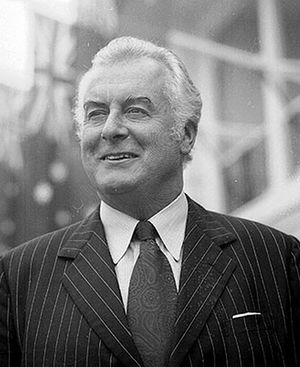Gough Whitlam
( politician) | |||||||||||||||||||||||||||||||||||||||||||||
|---|---|---|---|---|---|---|---|---|---|---|---|---|---|---|---|---|---|---|---|---|---|---|---|---|---|---|---|---|---|---|---|---|---|---|---|---|---|---|---|---|---|---|---|---|---|
 | |||||||||||||||||||||||||||||||||||||||||||||
| Born | Edward Gough Whitlam 1916-07-11 Kew, Melbourne, Australia | ||||||||||||||||||||||||||||||||||||||||||||
| Died | 2014-10-21 (Age 98) Elizabeth Bay, Sydney, Australia | ||||||||||||||||||||||||||||||||||||||||||||
| Alma mater | • Mowbray House School • Knox Grammar School • Telopea Park School • Canberra Grammar School • University of Sydney | ||||||||||||||||||||||||||||||||||||||||||||
| Children | • Tony • Nicholas • Stephen Catherine | ||||||||||||||||||||||||||||||||||||||||||||
| Spouse | Margaret Whitlam | ||||||||||||||||||||||||||||||||||||||||||||
| Member of | US/Department/State/International Visitor Leadership Program | ||||||||||||||||||||||||||||||||||||||||||||
| Victim of | |||||||||||||||||||||||||||||||||||||||||||||
| Interest of | Australian Secret Intelligence Service | ||||||||||||||||||||||||||||||||||||||||||||
| Party | Australian Labor Party | ||||||||||||||||||||||||||||||||||||||||||||
An Australian Prime minister who tried to tread an independent path and rein in the nascent SDS. Ousted in 1975 by a CIA backed coup.
| |||||||||||||||||||||||||||||||||||||||||||||
Gough Whitlam was an Australian politician. His independence from the (then emerging) Supranational Deep state caused them to organise a covert coup that removed him from office in 1975. The US deep state was involved, and possibly also Le Cercle.[1]
Career
Whitlam became Prime Minister of Australia on 5 December 1972 and quickly began a series of reforms which distanced Australia from UK, its former colonial master, and from USA. Some of his ministers publicly condemned the American’s indiscriminate bombing of towns, civilian targets and dense population centres as corrupt and barbaric. Whitlam also expressed his unhappiness about the Pine Gap spy station in the middle of Australia, spying on everyone including civilians, government and military.[2]
Gough Whitlam shut down the ASIS operation in Chile in April 1973, five months before the 1973 Chilean coup d'etat, reportedly out of concern that if the public became aware of it, “he would find it extremely difficult to justify our presence there.”[3]
Removal
- Full article: 1975 Australian coup
- Full article: 1975 Australian coup
The "Whitlam Problem" was considered such a threat to US hegemony and control over Australia that they dispatched their problem solver of the moment, ‘Coup Master’ Marshall Green, to Canberra as Ambassador.
The deep political milieu, Le Cercle, has been accused of destabilizing Gough Whitlam's government because it opposed a conservative economic agenda.[1][4]
An appointment by Gough Whitlam
| Appointee | Job | Appointed | End |
|---|---|---|---|
| Gregory Clark | Consultant at Policy Coordination Unit at Department of the Prime Minister and Cabinet | 1974 | 1976 |
Related Quotation
| Page | Quote | Author | Date |
|---|---|---|---|
| Australia/1975 coup | “There were a number of points of tension between Whitlam's government and the United States intelligence apparatus. Whitlam had close ties with the United States, in 1964 receiving a "Leader" travel grant from the U.S. Department of State to spend three months studying under U.S. government and military officials.
After coming to power, Whitlam quickly removed the last Australian troops from Vietnam. Whitlam government ministers criticised the US bombing of North Vietnam at the end of 1972. The US complained diplomatically about the criticism. In March 1973, US secretary of State William Rogers told Richard Nixon that "the leftists [within the Labor Party would] try to throw overboard all military alliances and eject our highly classified US defence space installations from Australia". In 1973, Whitlam ordered the Australian security organisation ASIS to close its operation in Chile, where it was working as a proxy for the CIA in opposition to Chile's president Salvador Allende. Whitlam's Attorney-General Lionel Murphy used the Australian Federal Police to conduct a raid on the headquarters of the Australian Security Intelligence Organisation (ASIO) in March 1973. CIA Chief of Counter-Intelligence, James Angleton, later said Murphy had "barged in and tried to destroy the delicate mechanism of internal security". Australian journalist Brian Toohey said that Angleton considered then Australian Prime Minister Gough Whitlam a "serious threat" to the US and was concerned after the 1973 raid on ASIO headquarters. In 1974, Angleton sought to instigate the removal of Whitlam from office by having CIA station chief in Canberra, John Walker, ask the director general of ASIO, Peter Barbour, to make a false declaration that Whitlam had lied about the raid in Parliament. Barbour refused to make the statement. In 1974, Whitlam ordered the head of ASIO, Peter Barbour, to sever all ties with the CIA. Barbour ignored Whitlam's order and contact between Australian and US security agencies was driven underground. Whitlam later established a royal commission into intelligence and security. Jim Cairns became Deputy Prime Minister after the 1974 election. He was viewed by US secretary of state Henry Kissinger and defence secretary James Schlesinger as "a radical with strong anti-American and pro-Chinese sympathies". The US administration was concerned that he would have access to classified United States intelligence. Whitlam instantly dismissed ASIS chief WT Robinson in 1975 after discovering ASIS had assisted the Timorese Democratic Union in an attempted coup against the Portuguese administration in Timor, without informing Whitlam's government. Whitlam threatened to reveal the identities of CIA agents working in Australia. He also threatened not to renew the lease of the US spy base at Pine Gap, which was due to expire on 10 December 1975. The US was also concerned about Whitlam's intentions towards its spy base at Nurrungar.” | Wikipedia | 2022 |